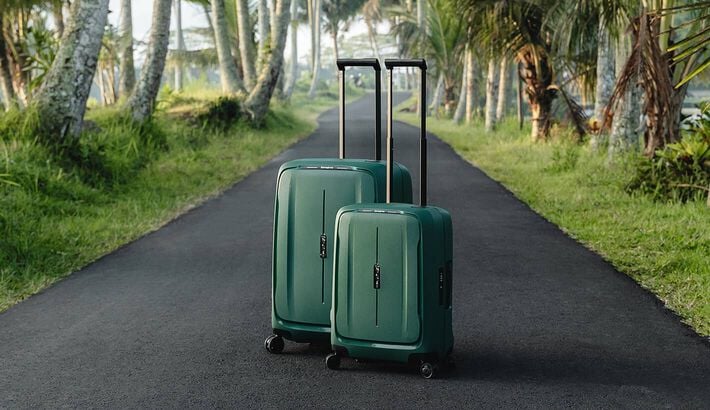Every journey has the power to connect us. The power to move us and the world forward. That's why we're committed to reducing our impact on the planet we love to explore through sustainable innovations and a legacy of designing durable products that last.
Explore our commitment to sustainability below.
Product
Innovation That Moves The Industry Forward
For over a century, Samsonite has been a leader— pioneering the first four-wheeled spinner luggage and three-point locking system—and leading in durability. But we’re not stopping there.
Our teams are committed to identifying innovations that help reduce our environmental impact. By developing limited-edition luggage collections that showcase our latest discoveries, we’re sparking new ideas for future breakthroughs.
For example, our limited edition Proxis Circular, launched in 2025, is made with at least 60% bio-circular and recycled materials. For the first time ever, we used recycled cooking oil collected from restaurant kitchens to form the ultra lightweight and durable Roxkin™ material in the outer shell of this product.

Durability That Goes The Distance
The most sustainable product is the one that lasts. That’s why designing durable, high-quality, functional products has long been part of our heritage.
Our products are thoroughly tested to endure the rigors of use and prove their reliability over time. Many of our manufacturing partners have on-site labs to put cases and bags through a series of demanding tests and trials to ensure products meet our specific requirements.

Drop Tests:
Luggage is cooled to very low temperatures, loaded with weights and dropped many times on wheels and shells from varying heights to assess impact resistance.

Zipper Tests:
Zippers are opened and closed thousands of times to ensure functionality and longevity.

Wheel Tests:
Suitcases are rolled over rough surfaces for many kilometers to test wheel endurance and performance.

Handle Tests:
Shoulder strap, bag and pull handles on bags and cases are subjected to repeated lifting and jerking to evaluate their strength and durability.

Temperature and Humidity Tests:
Products are exposed to extreme temperatures and humidity levels to assess material resilience under various environmental conditions.

Tumble Tests:
Cases are put in a giant spinning machine and tumbled over wooden and metal obstacles to simulate baggage-handling conditions.
ADVANCING REPAIRABILITY
Since 1976, we have offered repair services so customers can keep using their products.
We are working to further improve the repairability of our products. This includes considering repair when designing more and more of our products, incorporating more self-repair elements, ensuring better consistency of parts across collections, and utilizing product components that are easier to disassemble, such as clip-in elements or using screws instead of rivets. As part of our extensive product warranties covering materials and workmanship, we now offer repairs in approximately 70 countries globally, including in many stores.
To learn more about the repairability of your product, including cost, please visit our repair site below:

More Sustainable Materials
We’re innovating to reduce our footprint by incorporating more sustainable materials, like recycled content, while maintaining durability. In 2024, approximately 47% of Samsonite’s net sales came from products that incorporate some recycled materials.*
We introduced our first collection incorporating a portion of post-consumer recycled PET plastic from recycled water bottles. Since then, we’ve continuously expanded and scaled the use of recycled polyester in linings and outer fabrics.
We introduced the Samsonite S’Cure Eco, our first luggage with an outer shell made in part with post-consumer recycled polypropylene from household waste such as yogurt cups. Today, we incorporate the same materials in several best-selling hard-side products.
We expanded the use of recycled materials beyond plastics, launching products containing a portion of post-consumer recycled aluminum in the pull-handle, like in our ESSENS Limited Edition, from sources like airplanes, soda cans, and more. We re already working to expand the usage of recycled aluminum into our core collections.
*While many of our products include recycled materials in the lining, we are increasing the number of products that also incorporate recycled materials in other key components such as the outer shell and/or pull-handle tubes. In 2024, the weight of recycled materials incorporated in our products range from 0% to 75%.
End of Life: Closing the Loop
We are exploring how we can support our customers in recycling or repurposing their product at the end of its useful life.
To demonstrate how recycling old product can lead to new, in 2024, we introduced our ESSENS Limited Edition, an innovative step towards more circular design. The outer shell was made with at least 35% pre-owned recycled suitcases and at least 45% other recycled postconsumer waste by weight.
So far, we’ve implemented several regional pilots in Europe and Asia. For example, in Indonesia, we collected over 2,000 pre-owned luggages and - in collaboration with the upcycling agency WERGUD - converted them into colorful tables, floor mats and children’s play areas to revive the communal space in the Hang Tuah Park in Jakarta.

Planet

100% Renewable Electricity
We achieved 100% renewable electricity across our owned and operated retail stores, manufacturing and distribution facilities and offices for the first time in 2023, two years ahead of our target date. We achieved this through a combination of on-site solar generation, participation in green power programs, and purchasing renewable energy certificates. Our manufacturing and distribution facilities including Oudenaarde, Belgium and Nashik, India have on-site solar installations.
Value Chain Emissions
The vast majority of our carbon emissions come from the materials used in our products. That's why we're focused on increasing the use of lower-carbon materials such as recycled polyester, recycled polypropylene and polycarbonate as well as recycled aluminium.
To formalize our commitment, we have set an ambitious target to reduce emissions from purchased goods and services by 52% per unit of gross profit by 2030, compared to our 2022 baseline. On Group-level, this goal has been validated by the Science-Based Targets initiative.


More Sustainable Packaging
In order to reduce waste, we have defined sustainable packaging principles across the organization: Reduce material use, use reusable and recyclable packaging, and prioritize more sustainable materials where possible. In 2025, we will begin rolling these out across our operations.
People

Professional Development
Our people are the driving force behind our business and sustainability efforts. We have reached our goal of providing professional development opportunities to all employees by the end of 2024—a year ahead of schedule.
We offer opportunities like leadership training, skills development, and performance management tools to all employees— in line with our commitment to helping our employees reach their full potential.
Culture & Inclusion
We are a global brand, and our culture comprises many nationalities and backgrounds. We strive to make sure that Samsonite is a welcoming place and that we create a workplace environment and business culture that helps our teams grow and thrive together.
Our bi-annual Culture & Inclusion Survey provides valuable perspectives from our teams. Guided by this feedback, we are committed to prioritizing innovation, recognition, professional development, and teamwork as key areas for ongoing growth.


SAFE WORKING CONDITIONS ACROSS OUR SUPPLY CHAIN
We work closely with our suppliers to promote fair and safe working environment. We ask all finished goods suppliers, as well as certain raw material and component suppliers to sign our Ethical Charter, which is our code of conduct for suppliers. This charter which sets out 10 key principles for protecting people in our supply chain. Our suppliers are then required to share our expectations with their own suppliers.
We also enroll a subset of suppliers into our Global Social Compliance Program for auditing. Throughout the year, we conduct various activities, such as supplier trainings, to promote a greater understanding of social compliance topics and improve supplier performance in subsequent certifications and audits.
Transparency is important to us. Since 2017, the Samsonite Group has been reporting on our sustainability efforts and continues to do so today.
In 2020, we introduced our sustainability strategy, Our Responsible Journey, which builds on our 115-year legacy of innovation and is the compass guiding our decision-making on our journey to 2030.





